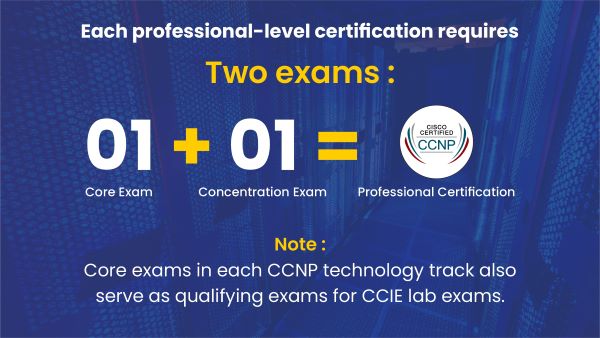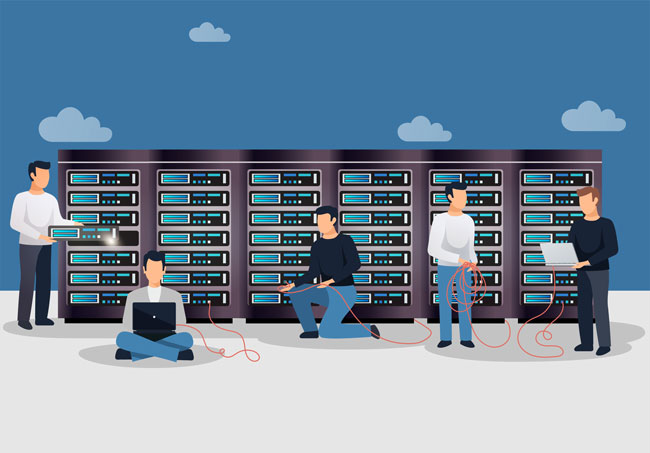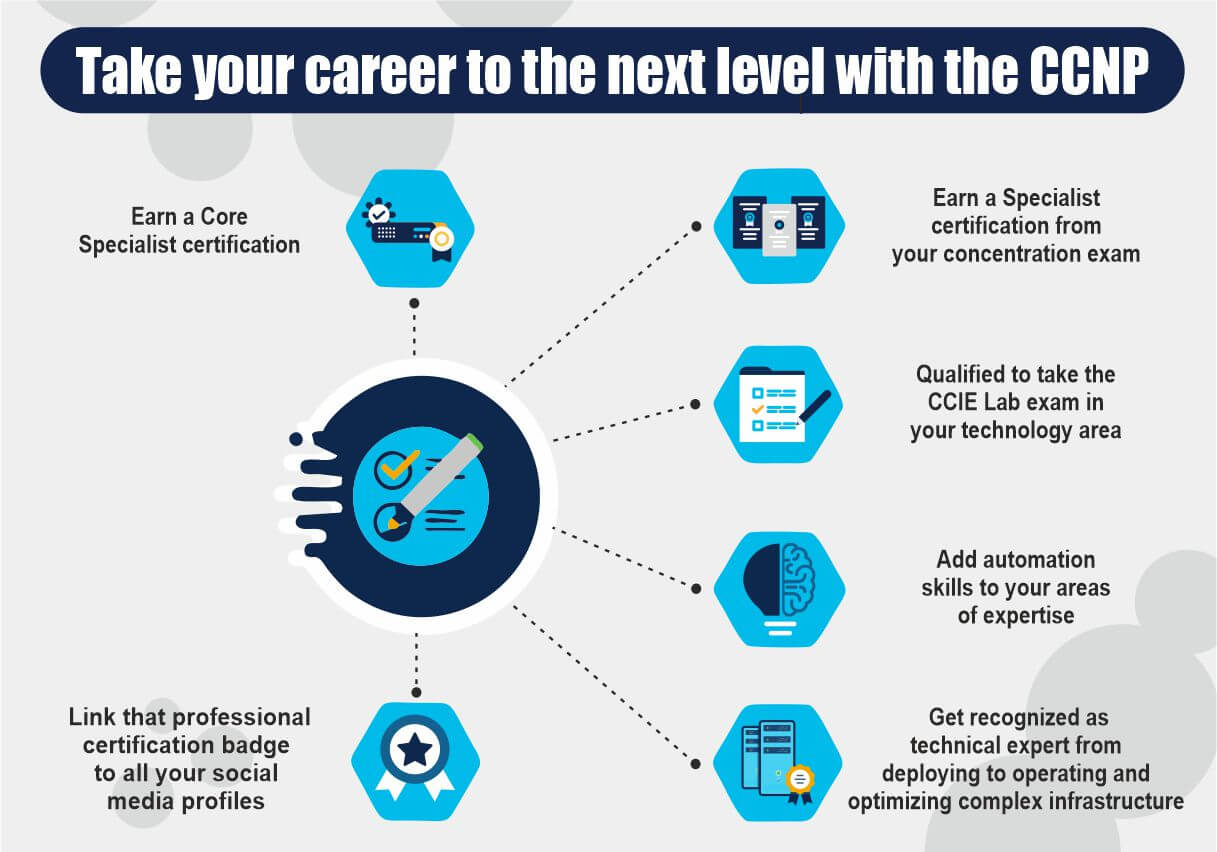
CCNP Data Center Course Training in Mumbai, India
Course Highlights
 Training Mode
Training Mode
Classroom and Online Learning Method
Learning Method
Lecture & Self-Study Duration
Duration
2 Months Training Hours
Training Hours
2 Hours per day Hands on Labs (Physical Devices)
Hands on Labs (Physical Devices)
Yes Study Material
Study Material
Yes Certificate
Certificate
Yes Batches
Batches
Weekdays (Mon-Fri) & Weekend (Sat-Sun) Price
Price
Enquire now


CCNP Data Center Course overview
Octa Networks, India’s number one and best Cisco training center located in Mumbai, offers onsite and online CCNP Data Center training to candidates worldwide. We are one of the pioneers in India providing high-end quality CCNP Data Center Training and Boot camps in our 24x7 physical lab setup. Our CCNP Data Center Racks are fully equipped with physical devices as per latest Cisco CCNP Data Center exam blueprints.
CCNP Data Center is a Cisco certification that shows you're an expert at handling big data in large offices. This certificate proves you can expertly manage enterprise-sized data centers. To get this certificate, you need to pass two exams. One exam tests your knowledge of core data center technologies like networks, computers, storage networks, automation, and security. The other exam allows you to showcase your expertise in your chosen specialty. Once you pass both exams, you'll be recognized as a skilled professional capable of running a super efficient data center.
Our modular CCNP Data Center training programs aimed at catering to various technological needs and demands of the individuals and the industry. We have successfully helped a large number of students to achieve their Cisco certification goals in the last 10+ years. Octa Networks means guaranteed technical training which ultimately leads to Cisco certifications.
To achieve new CCNP Data Center certification, the candidate will have to pass not more than 2 exams. Any additional specializations are most welcome but the candidate needs to pass a core exam and one of the concentration exam options available in the respective track. Besides the CCNP Data Center, core exam also acts as qualifying criteria for attempting the CCIE Data Center lab exam.
CCNA is no longer a qualifying criterion for attempting CCNP Data Center. Candidates can straight away appear for CCNP Data Center examinations provided they have the necessary knowledge and grasp of the practical application of the know-how.

To earn CCNP Data Center certification, candidates need to pass core exam which covers core enterprise technology and one concentration exam of his/her choice based on his/her technical area of focus or job role requirement.
CCNP Data Center Core exam:
- 350-601 - Implementing and Operating Cisco Data Center Core Technologies (DCCOR v1.1)
CCNP Data Center Concentration exam:
- 300-610 - Designing Cisco Data Center Infrastructure (DCID v1.1)
- 300-615 - Troubleshooting Cisco Data Center Infrastructure (DCIT v1.1)
- 300-620 - Implementing Cisco Application Centric Infrastructure (DCACI v1.1)
- 300-630 - Implementing Cisco Application Centric Infrastructure - Advanced (DCACIA v1.1)
- 300-635 - Implementing Automation for Cisco Data Center Solutions (DCAUTO v1.1)
The new CCNP Data Center Course was released on June 20, 2023, and the first date to test on the new exam material will be on the same day. The current version of the CCNP Data Center Course was retired on June 19, 2023.
Octa Networks is providing CCNP Enterprise Bootcamps and focused training facilities across India and abroad. We are proud of our track record of guiding and coaching our students to achieve their CCNP certifications.
CCNP Data Center Certification Course Details
Total Course Duration
- 2 months of Instructor-led classroom training
- 2 months of instructor-led online training
Who should enroll?
- Anyone having Diploma, BA, BCOM, BSC, BE or BCA Degree.
- Network engineers looking for the enhancement of their skills and acquire in-depth know-how in Data Center technology based on their interests or professional-level job roles.
What is CCNP Data Center Course Curriculum?
Our New CCNP DC training has been designed & developed adhering to latest Cisco Blueprint and includes all modules of CCNP Data Center Exam
Core Training (mandatory):
Duration
- 1 month of Instructor-led classroom training
- 1 month of instructor-led online training
What you’ll learn in this course?
- Implement data center compute, LAN and SAN infrastructure
- Essentials of automation and security in data centers
- Deploying, securing, operating, and maintaining Cisco data center infrastructure
- Hands-on experience on Cisco MDS Switches and Cisco Nexus Switches; Cisco Unified Computing System B-Series Blade Servers, and Cisco UCS C-Series Rack Servers
How you'll benefit
Upon completion of this course, candidates will have the skills and knowledge to:
- Gain experience implementing, securing and automating network, compute, and storage infrastructure
- Gain knowledge and skills through Cisco’s unique combination of lessons and hands-on practice using enterprise-grade Cisco learning technologies, data center equipment, and software
- Qualify for professional and expert-level job roles in the high-demand area of enterprise-class data center environments
- Prepare for the Implementing and Operating Cisco Data Center Core Technologies (DCCOR) exam
Prerequisites
Knowledge and skills you should have before attending this course:
- Familiarity with Ethernet and TCP/IP networking
- Familiarity with SANs
- Familiarity with Fibre Channel protocol
- Identify products in the Cisco Data Center Nexus and Cisco MDS families
- Understanding of Cisco Enterprise Data Center architecture
- Understanding of server system design and architecture
- Familiarity with hypervisor technologies (such as VMware)
These Cisco courses are recommended to help you meet these prerequisites:
- Implementing and Administering Cisco Solutions (CCNA)
- Understanding Cisco Data Center Foundations (DCFNDU)
Training Outline
*(star marked) - section is self-study material that can be done at your own pace after the instructor-led portion of the course.
- Implementing Data Center Switching Protocols*
- Spanning Tree Protocol
- Port Channels Overview
- Implementing First-Hop Redundancy Protocols*
- Hot Standby Router Protocol (HSRP) Overview
- Virtual Router Redundancy Protocol (VRRP) Overview
- Implementing Routing in Data Center*
- Open Shortest Path First (OSPF) v2 and Open Settlement Protocol (OSP) v3
- Border Gateway Protocol
- Implementing Multicast in Data Center*
- IP Multicast in Data Center Networks
- Internet Group Management Protocol (IGMP) and Multicast Listener Discovery (MLD)
- Implementing Network Infrastructure Security*
- User Accounts and Role Based Access Control (RBAC)
- Authentication, Authorization, and Accounting (AAA) and SSH on Cisco NX-OS
- Describing Packet Flow in Data Center Network*
- Data Center Traffic Flows
- Packet Flow in Cisco Nexus Switches
- Describing Data Center Network Infrastructure Management, Maintenance, and
Operations*
- Time Synchronization
- Network Configuration Management
- Explaining Cisco Network Assurance Concepts*
- Need for Network Assurance
- Cisco Streaming Telemetry Overview
- Implementing Storage Infrastructure Security*
- User Accounts and RBAC
- Authentication, Authorization, and Accounting
- Describing Data Center Storage Infrastructure Maintenance and Operations*
- Time Synchronization
- Software Installation and Upgrade
- Describing Cisco UCS Server Form Factors*
- Cisco UCS B-Series Blade Servers
- Cisco UCS C-Series Rack Servers
- Implementing Data Center Overlay Protocols
- Cisco Overlay Transport Virtualization
- Virtual Extensible LAN
- Describing Cisco Application-Centric Infrastructure
- Cisco ACI Overview, Initialization, and Discovery
- Cisco ACI Management
- Describing Cisco ACI Building Blocks and VMM Domain Integration
- Tenant-Based Components
- Cisco ACI Endpoints and Endpoint Groups (EPG)
- Describing Cisco Cloud Service and Deployment Models
- Cloud Architectures
- Cloud Deployment Models
- Implementing Fibre Channel Fabric
- Fibre Channel Basics
- Virtual Storage Area Network (VSAN) Overview
- Implementing Storage Infrastructure Services
- Distributed Device Aliases
- Zoning
- Implementing FCoE Unified Fabric
- Fibre Channel over Ethernet
- Describing FCoE
- Implementing Cisco Unified Computing Network Connectivity
- Cisco UCS Fabric Interconnect
- Cisco UCS B-Series Connectivity
- Implementing Cisco Unified Computing Server Abstraction
- Identity Abstraction
- Service Profile Templates
- Implementing Cisco Unified Computing SAN Connectivity
- iSCSI Overview
- Fibre Channel Overview
- Implementing Unified Computing Security
- User Accounts and RBAC
- Options for Authentication
- Introducing Cisco HyperFlex Systems*
- Hyperconverged and Integrated Systems Overview
- Cisco HyperFlex Solution
- Describing Data Center Unified Computing Management, Maintenance, and Operations*
- Compute Configuration Management
- Software Updates
- Implementing Cisco Data Center Automation and Scripting Tools*
- Cisco NX-OS Programmability
- Scheduler Overview
- Describing Cisco Integration with Automation and Orchestration Software Platforms
- Cisco and Ansible Integration Overview
- Cisco and Puppet Integration Overview
- Describing Cisco Data Center Automation and Orchestration Technologies*
- Power On Auto Provisioning
- Cisco Data Center Network Manager Overview
Exam Topics : View/Download PDF
Hands-on Labs
- Configure Virtual Extensible LAN (VXLAN)
- Explore the Cisco ACI Fabric
- Implement Cisco ACI Access Policies and Out-of-Band Management
- Implement Cisco ACI Tenant Policies
- Integrate Cisco ACI with VMware
- Configure Fibre Channel
- Configure Device Aliases
- Configure Zoning
- Configure NPV
- Provision Cisco UCS Fabric Interconnect Cluster
- Configure Server and Uplink Ports
- Configure VLANs
- Configure a Cisco UCS Server Profile Using Hardware Identities
- Configure Basic Identity Pools
- Configure a Cisco UCS Service Profile Using Pools
- Configure an Internet Small Computer Systems Interface (iSCSI) Service Profile
- Configure Cisco UCS Manager to Authenticate Users with Microsoft Active Directory
- Configure Cisco Nexus Switches with Ansible
- Program a Cisco Nexus Switch with Python
- Automate Cisco Application-Centric Infrastructure Configuration
What to expect in the exam
- 350-601 DCCOR exam tests your knowledge of implementing core data center technologies including network, compute, storage network, automation, and security.
- After you pass 350-601 DCCOR, You earn the Cisco Certified Specialist – Data Center Core certification.
- You satisfy the core requirement for CCNP Data Center and CCIE Data Center certification. To complete your CCNP Data Center certification, pass any one of the concentration exam.
Concentration Training (choose one):
Duration
- 1 month of Instructor-led classroom training
- 1 month of instructor-led online training
What you’ll learn in this course?
- Deploy, configure and manage Cisco Nexus 9000 Series Switches in ACI mode
- Connect the Cisco ACI fabric to external networks and services
- Fundamentals of Virtual Machine Manager (VMM) integration
- Hands-on practice implementing key capabilities such as fabric discovery, policies, connectivity, VMM integration, and more
How you'll benefit
Upon completion of this course, candidates will have the skills and knowledge to:
- Gain the skills and hands-on practice integrating the enhanced, automated capabilities of Cisco Nexus 9000 Series Switches in ACI mode for quicker application deployment.
- Get the knowledge for protocols, solutions and designs to acquire professional-level and expert-level data center job roles.
- Prepare for Implementing Cisco Application Centric Infrastructure (300-620 DCACI) exam.
Prerequisites
Knowledge and skills you should have before attending this course:
- Understanding of networking protocols, routing, and switching
- Familiarity with Cisco Ethernet switching products
- Understanding of Cisco data center architecture
- Familiarity with virtualization fundamentals
The following Cisco courses may help you meet these prerequisites:
- Implementing and Administering Cisco Solutions (CCNA)
- Understanding Cisco Data Center Foundations (DCFNDU)
Training Outline
- Introducing Cisco ACI Fabric Infrastructure and Basic Concepts
- What Is Cisco ACI?
- Cisco ACI Topology and Hardware
- Cisco ACI Object Model
- Faults, Event Record, and Audit Log
- Cisco ACI Fabric Discovery
- Cisco ACI Access Policies
- Describing Cisco ACI Policy Model Logical Constructs
- Cisco ACI Logical Constructs
- Tenant
- Virtual Routing and Forwarding
- Bridge Domain
- Endpoint Group
- Application Profile
- Tenant Components Review
- Adding Bare-Metal Servers to Endpoint Groups
- Contracts
- Describing Cisco ACI Basic Packet Forwarding
- Endpoint Learning
- Basic Bridge Domain Configuration ****
- Introducing External Network Connectivity
- Cisco ACI External Connectivity Options
- External Layer 2 Network Connectivity
- External Layer 3 Network Connectivity
- Introducing VMM Integration
- VMware vCenter VDS Integration
- Resolution Immediacy in VMM
- Alternative VMM Integrations
- Describing Layer 4 to Layer 7 Integrations
- Service Appliance Insertion Without ACI L4-L7 Service Graph
- Service Appliance Insertion via ACI L4-L7 Service Graph
- Service Graph Configuration Workflow
- Service Graph PBR Introduction
- Explaining Cisco ACI Management
- Out-of-Band Management
- In-Band Management
- Syslog
- Simple Network Management Protocol
- Configuration Backup
- Authentication, Authorization, and Accounting
- Role-Based Access Control
- Cisco ACI Upgrade
- Collect Tech Support
Exam Topics : View/Download PDF
Hands-on Labs
- Validate Fabric Discovery
- Configure Network Time Protocol (NTP)
- Create Access Policies and Virtual Port Channel (vPC)
- Enable Layer 2 Connectivity in the Same Endpoint Group (EPG)
- Enable Inter-EPG Layer 2 Connectivity
- Enable Inter-EPG Layer 3 Connectivity
- Compare Traffic Forwarding Methods in a Bridge Domain
- Configure External Layer 2 (L2Out) Connection
- Configure External Layer 3 (L3Out) Connection
- Integrate Application Policy Infrastructure Controller (APIC) With VMware vCenter Using VMware Distributed Virtual Switch (DVS)
What to expect in the exam
- 300-620 DCACI exam tests your knowledge of Cisco switches in ACI mode including configuration, implementation, and management.
- After you pass 300-620 DCACI, You earn the Cisco Certified Specialist – Data Center ACI Implementation certification.
- You satisfy the concentration requirement for the CCNP Data Center certification. To complete your CCNP Data Center certification, you must pass 350-601 DCCOR exam.
Duration
- 1 month of Instructor-led classroom training
- 1 month of instructor-led online training
What you’ll learn in this course?
- Implement, manage, and troubleshoot Cisco MDS 9000 Series Switches, to build highly available, scalable storage networks
- Deploy and use capabilities such as Virtual Storage Area Networks (VSANs), Role-Based Access Control (RBAC), N-Port Virtualization (NPV) fabric security, zoning, automation with NX-API, Slow Drain Analysis, SAN analytics, Fibre Channel over TCP/IP (FCIP) tunnels, and more
- Configure and implement platform features and learn troubleshooting techniques pertaining to Fibre Channel (FC) domains, firmware upgrades, zones, and zone mergers
How you'll benefit
Upon completion of this course, candidates will have the skills and knowledge to:
- Learn how to deploy and troubleshoot the Cisco Nexus 9000 Series Switches to support performance, resiliency, scalability, and enhanced operations for data centers
- Gain knowledge and skills through Cisco’s unique combination of lessons and hands-on practice using enterprise-grade Cisco learning technologies, data center equipment, and software
- Succeed in today’s demanding data center operations roles
- Prepare for Configuring Cisco MDS 9000 Series Switches (300-625 DCSAN) exam.
Prerequisites
Knowledge and skills you should have before attending this course:
- Basic understanding of data storage hardware components and protocols, including Small Computer System Interface (SCSI) and Fibre Channel
- Basic understanding of network protocols, including Ethernet and IP
- Basic routing and switching knowledge
These are the recommended Cisco learning offerings that may help you meet these prerequisites:
- Implementing Cisco Application Centric Infrastructure (DCACI)
- Implementing and Administering Cisco Solutions (CCNA®)
- Understanding Cisco Data Center Foundations (DCFNDU)
Training Outline
- Describing Cisco MDS Platform
- Cisco MDS 9700/9300/9200/9100 Hardware
- Cisco NX-OS
- Cisco DCNM
- Fibre Channel Architecture
- FCoE Architecture
- Describing Key Product Features
- Cisco DCNM 11.x
- RBAC and Authentication, Authorization, and Accounting (AAA)
- Virtual SANs
- NPV and NPIV
- Port Channels and VSAN Trunking
- Zoning and Smart Zoning
- Device Aliases
- Inter-VSAN Routing
- Fibre Channel Fabric Security
- Describing New Product Features
- 32-Gb Fibre Channel
- Cisco MDS NX-API
- Power-On Auto-Provisioning
- Slow Drain Analysis
- SAN Analytics and Telemetry Streaming
- Cisco Secure Boot
- Deploying Cisco MDS Features
- Installation and Initial Setup
- Building a Fabric: FC Domains and FC Services
- Building SAN Extensions
- Troubleshooting Common Cisco MDS Issues
- Fibre Channel Domains
- Zones and Zone Merges
- Boot and Upgrade Issues
Hands-on Labs
- Examine Local and Remote Endpoint Learning
- Verify Bounce Entries
- Validate IP Learning
- Mitigate IP and MAC Flapping with the Rogue Endpoint Feature
- Enable Transit Routing
- Implement VRF Route Leaking
- Configure VRF Route Leaking with L3Out
- Examine Contracts and Zoning Rules
- Configure Policy-Based Redirect to Layer 4–7 Service Node
- Deploy Multi-Pod Fabric
- Provision Policies with Cisco ACI Multi-Site Orchestrator
What to expect in the exam
- 300-625 DCSAN exam tests your knowledge of Cisco MDS 9000 Series Switches including deployment, implementation, management and monitoring, and troubleshooting.
- After you pass 300-625 DCSAN, You earn the Cisco Certified Specialist – Data Center SAN Implementation certification.
- You satisfy the concentration requirement for the CCNP Data Center certification. To complete your CCNP Data Center certification, you must pass 350-601 DCCOR exam.
Concentration Training (additional cost):
Duration
- 1 month of Instructor-led classroom training
- 1 month of instructor-led online training
What you’ll learn in this course?
- Design and deployment options focused on Cisco data center solutions and technologies across network, compute, virtualization, storage area networks, automation, and security
- Design practices for the Cisco Unified Computing System (Cisco UCS) solution based on Cisco UCS B-Series and C-Series servers, Cisco UCS Manager, and Cisco Unified Fabric
- Design experience with network management technologies including Cisco UCS Manager, Cisco Data Center Network Manager (DCNM), and Cisco UCS Director
How you'll benefit
Upon completion of this course, candidates will have the skills and knowledge to:
- Make design choices for optimal data center infrastructure performance, virtualization, security, and automation
- Master the practical and theoretical knowledge necessary to design a scalable, reliable, and intelligent data center based on Cisco technologies
- Qualify for professional-level job roles in the high-demand area of enterprise-class data center environments
- Validate your knowledge and prepare to take the Designing Cisco Data Center Infrastructure (300-610 DCID) exam
Prerequisites
Before taking this training, you should be able to:
- Implement data center networking [Local Area Network (LAN) and Storage Area Network (SAN)]
- Describe data center storage
- Implement data center virtualization
- Implement Cisco Unified Computing System (Cisco UCS)
- Implement data center automation and orchestration with the focus on Cisco Application Centric Infrastructure (ACI) and Cisco UCS Director
- Describe products in the Cisco Data Center Nexus and Multilayer Director Switch (MDS) families
To fully benefit from this training, you should have completed the following trainings or obtained the equivalent level of knowledge:
- Understanding Cisco Data Center Foundations (DCFNDU)
- Implementing and Administering Cisco Networking Technologies (CCNA®)
- Implementing Cisco Data Center Core Technologies (DCCOR)
Training Outline
- Describing Basic Data Center Security
- Threat Mitigation
- Attack and Countermeasure Examples
- Secure the Management Plane
- Protect the Control Plane
- RBAC and Authentication, Authorization, and Accounting (AAA)
- Describing Cisco FEX Options
- Cisco Adapter FEX
- Access Layer with Cisco FEX
- Cisco FEX Topologies
- Virtualization-Aware Networking
- Single Root I/O Virtualization
- Cisco FEX Evaluation
- Describing High Availability on Layer 2
- Overview of Layer 2 High-Availability Mechanisms
- Virtual Port Channels
- Cisco FabricPath
- Virtual Port Channel+
- Designing Layer 3 Connectivity
- First Hop Redundancy Protocols
- Improve Routing Protocol Performance and Security
- Enhance Layer 3 Scalability and Robustness
- Designing Data Center Topologies
- Data Center Traffic Flows
- Cabling Challenges
- Access Layer
- Aggregation Layer
- Core Layer
- Spine-and-Leaf Topology
- Redundancy Options
- Designing Data Center Interconnects with Cisco OTV
- Cisco OTV Overview
- Cisco OTV Control and Data Planes
- Failure Isolation
- Cisco OTV Features
- Optimize Cisco OTV
- Evaluate Cisco OTV
- Describing Locator/ID Separation Protocol
- Locator/ID Separation Protocol
- Location Identifier Separation Protocol (LISP) Virtual Machine (VM) Mobility
- LISP Extended Subnet Mode (ESM) Multihop Mobility
- LISP VPN Virtualization
- Describing VXLAN Overlay Networks
- Describe VXLAN Benefits over VLAN
- Layer 2 and Layer 3 VXLAN Overlay
- Multiprotocol Border Gateway Protocol (MP-BGP) Ethernet VPN (EVPN) Control Plane Overview
- VXLAN Data Plane
- Describing Hardware and Device Virtualization
- Hardware-Based High Availability
- Device Virtualization
- Cisco UCS Hardware Virtualization
- Server Virtualization
- SAN Virtualization
- N-Port ID Virtualization
- Describing Advanced Data Center Security
- Cisco TrustSec in Cisco Secure Enclaves Architecture
- Cisco TrustSec Operation
- Firewalling
- Positioning the Firewall Within Data Center Networks
- Cisco Firepower® Portfolio
- Firewall Virtualization
- Design for Threat Mitigation
- Describing Management and Orchestration
- Network and License Management
- Cisco UCS Manager
- Cisco UCS Director
- Cisco Intersight
- Cisco DCNM Overview
- Describing Storage and RAID Options
- Position DAS in Storage Technologies
- Network-Attached Storage
- Fibre Channel, FCoE, and Internet Small Computer System Interface (iSCSI)
- Evaluate Storage Technologies
- Describing Fibre Channel Concepts
- Fibre Channel Connections, Layers, and Addresses
- Fibre Channel Communication
- Virtualization in Fibre Channel SAN
- Describing Fibre Channel Topologies
- SAN Parameterization
- SAN Design Options
- Choosing a Fibre Channel Design Solution
- Describing FCoE
- FCoE Protocol Characteristics
- FCoE Communication
- Data Center Bridging
- FCoE Initialization Protocol
- FCoE Design Options
- Describing Storage Security
- Common SAN Security Features
- Zones
- SAN Security Enhancements
- Cryptography in SAN
- Describing SAN Management and Orchestration
- Cisco DCNM for SAN
- Cisco DCNM Analytics and Streaming Telemetry
- Cisco UCS Director in the SAN
- Cisco UCS Director Workflows
- Describing Cisco UCS Servers and Use Cases
- Cisco UCS C-Series Servers
- Fabric Interconnects and Blade Chassis
- Cisco UCS B-Series Server Adapter Cards
- Stateless Computing
- Cisco UCS Mini
- Describing Fabric Interconnect Connectivity
- Use of Fabric Interconnect Interfaces
- VLANs and VSANs in a Cisco UCS Domain
- Southbound Connections
- Northbound Connections
- Disjoint Layer 2 Networks
- Fabric Interconnect High Availability and Redundancy
- Describing Hyperconverged and Integrated Systems
- Hyperconverged and Integrated Systems Overview
- Cisco HyperFlex™ Solution
- Cisco HyperFlex Scalability and Robustness
- Cisco HyperFlex Clusters
- Cluster Capacity and Multiple Clusters on One Cisco UCS Domain
- External Storage and Graphical Processing Units on Cisco HyperFlex
- Cisco HyperFlex Positioning
- Describing Cisco UCS Manager Systemwide Parameters
- Cisco UCS Setup and Management
- Cisco UCS Traffic Management
- Describing Cisco UCS RBAC
- Roles and Privileges
- Organizations in Cisco UCS Manager
- Locales and Effective Rights
- Authentication, Authorization, and Accounting
- Two-Factor Authentication
- Describing Pools for Service Profiles
- Global and Local Pools
- Universally Unique Identifier (UUID) Suffix and Media Access Control (MAC) Address Pools
- World Wide Name (WWN) Pools
- Server and iSCSI Initiator IP Pools
- Describing Policies for Service Profiles
- Global vs. Local Policies
- Storage and Basic Input/Output System (BIOS) Policies
- Boot and Scrub Policies
- Intelligent Platform Management Interface (IPMI) and Maintenance Policies
- Describing Network-Specific Adapters and Policies
- LAN Connectivity Controls
- SAN Connectivity Controls
- Virtual Access Layer
- Connectivity Enhancements
- Describing Templates in Cisco UCS Manager
- Cisco UCS Templates
- Service Profile Templates
- Network Templates
- Designing Data Center Automation
- Model-Driven Programmability
- Cisco NX-API Overview
- Programmability Using Python
- Cisco Ansible Module
- Use the Puppet Agent
Exam Topics : View/Download PDF
Hands-on Labs
- Design Virtual Port Channels
- Design First Hop Redundancy Protocol (FHRP)
- Design Routing Protocols
- Design Data Center Topology for a Customer
- Design Data Center Interconnect Using Cisco OTV
- Design Your VXLAN Network
- Create a Cisco FEX Design
- Design Management and Orchestration in a Cisco UCS Solution
- Design a Fibre Channel Network
- Design and Integrate an FCoE Solution
- Design a Secure SAN
- Design Cisco UCS Director for Storage Networking
- Design a Cisco UCS Domain and Fabric Interconnect Cabling
- Design a Cisco UCS C-Series Server Implementation
- Design Cisco UCS Fabric Interconnect Network and Storage Connectivity
- Design Systemwide Parameters in a Cisco UCS Solution
- Design an LDAP Integration with a Cisco UCS Domain
- Design Pools for Service Profiles in a Cisco UCS Solution
- Design Network-Specific Adapters and Policies in a Cisco UCS Solution
What to expect in the exam
- 300-610 DCID exam tests your knowledge of data center infrastructure design including network, compute, storage network, and automation.
- After you pass 300-610 DCID, you earn the Cisco Certified Specialist – Data Center Design certification.
- You satisfy the concentration requirement for the CCNP Data Center certification. To complete your CCNP Data Center certification, you must pass 350-601 DCCOR exam.
Duration
- 1 month of Instructor-led classroom training
- 1 month of instructor-led online training
What you’ll learn in this course?
- Troubleshoot LAN, SAN, Cisco Data Center Unified Fabric, Cisco Unified Computing System (Cisco UCS), and Cisco Application-Centric Infrastructure (Cisco ACI)
- Methodologies and tools to identify issues that may occur in data center network architecture
- Hands-on practice troubleshooting installation, configuration and interconnectivity issues on Cisco Multilayer Director Switch (MDS) switches, Cisco Nexus switches, Cisco Fabric Extenders (FEXs), Cisco UCS, Cisco ACI, and more
How you'll benefit
Upon completion of this course, candidates will have the skills and knowledge to:
- Learn how to deploy and troubleshoot various components of Cisco data center infrastructure to support performance, resiliency, scalability needs
- Gain knowledge and skills through Cisco’s unique combination of lessons and hands-on practice using enterprise-grade Cisco learning technologies, data center equipment, and software
- Qualify for professional-level job roles
- Prepare for the Troubleshooting Cisco Data Center Infrastructure (300-615 DCIT) exam
Prerequisites
To fully benefit from this training, you should have the following knowledge and skills:
- Configure, secure, and maintain LAN and SAN based on Cisco Nexus and MDS switches
- Configure, secure, and maintain Cisco Unified Computing System
- Configure, secure, and maintain Cisco ACI
The following Cisco trainings may help you meet these prerequisites:
- Implementing and Administering Cisco Networking Technologies (CCNA®)
- Understanding Cisco Data Center Foundations (DCFNDU)
- Implementing and Operating Cisco Data Center Core Technologies (DCCOR)
- Introducing Cisco NX-OS Switches and Fabrics in the Data Center (DCINX)
- Configuring Cisco NX-OS Switches and Fabrics in the Data Center (DCCNX)
- Introducing Cisco Unified Computing System (DCIUCS)
- Configuring Cisco Unified Computing System (DCCUCS)
Training Outline
- Describing the Troubleshooting Process
- Troubleshooting Overview
- Narrow Down the Cause of the Problem
- Understanding CLI Troubleshooting Tools
- Ping, Pong, and Traceroute
- Debugging, Event History, and System Monitoring
- SPAN and Encapsulated Remote SPAN
- Ethanalyzer and Data Plane Sampling Capture
- Logging
- Cisco Generic Online Diagnostics
- SNMP, Cisco EEM, and RMON
- Troubleshooting VLANs and PVLANs
- Troubleshoot VTP
- Troubleshoot Layer 2 Issues
- VLANs and SVIs on Cisco Nexus Series Switches
- Troubleshoot VLANs, PVLANs, and SVIs
- Troubleshoot Rapid PVST+
- Troubleshooting Port Channels and Virtual Port Channels
- Port Channel Overview
- vPC Overview
- Common vPC Issues
- Troubleshooting Cisco OTV
- Cisco OTV Features
- Common Cisco OTV Issues
- Cisco OTV Troubleshooting
- HSRP Isolation Between Data Centers Using Cisco OTV
- Troubleshooting VXLAN
- VXLAN Overlay Features
- VXLAN MP-BGP Ethernet VPN
- Common VXLAN Issues
- VXLAN Troubleshooting
- Troubleshooting Routing and High-Availability Protocols
- Troubleshoot Basic Routing Issues
- Troubleshoot OSPFv2 and OSPFv3
- Troubleshoot EIGRP
- Troubleshoot PIM
- Troubleshoot FHRP
- Troubleshoot Data Center LAN Security
- Troubleshoot AAA and RBAC
- Troubleshoot First-Hop Security
- Troubleshoot CoPP
- Troubleshoot ACLs
- Troubleshooting Platform-Specific Issues
- Cisco Fabric Services Overview
- Troubleshoot Cisco Fabric Services
- Configure and Troubleshoot Configuration Profiles
- Common VDC Issues
- Troubleshoot VDC
- Troubleshoot VRF
- Cisco FEX Troubleshooting
- Troubleshoot Cisco ISSU
- Troubleshooting Fibre Channel Interfaces
- Fibre Channel Overview
- Troubleshoot Fibre Channel Interfaces and Device Registration
- Troubleshoot SAN Port Channels
- Troubleshoot Port Security and Fabric Binding
- Troubleshooting Fibre Channel Fabric Services
- Troubleshoot VSANs
- Troubleshoot Fibre Channel Domain and Name Services
- Troubleshoot Zoning and Fabric Merges
- Troubleshoot Cisco Fabric Services
- Troubleshooting NPV Mode
- NPIV and NPV Overview
- Troubleshoot NPV Mode
- Troubleshooting FCoE
- FCoE and FIP Overview
- Troubleshoot FIP
- Troubleshoot FCoE- and QoS-Related Issues
- Troubleshoot DCB
- Troubleshooting Cisco UCS Architecture and Initialization
- Troubleshoot Fabric Interconnect in Standalone and Cluster Mode
- Troubleshoot Cisco UCS Management Access
- Troubleshoot Cisco UCS Manager CLI
- Troubleshoot Cisco UCS with Embedded Tools
- Troubleshoot Cisco UCS Hardware Discovery
- Troubleshooting Cisco UCS Configuration
- Stateless Computing
- Troubleshoot Service Profile Association Issues
- Cisco UCS Manageability
- Troubleshoot Authentication Failures
- Troubleshooting Cisco UCS B-Series Servers
- Troubleshoot Cisco UCS B-Series Server Boot
- Troubleshoot Operating System Drivers
- Troubleshoot Remote Access
- Troubleshoot Server Hardware
- Troubleshooting Cisco UCS B-Series LAN and SAN Connectivity
- Troubleshoot Link-Level Issues
- Troubleshoot Connectivity Issues for Specific Servers
- Troubleshoot Intermittent Connectivity
- Troubleshoot Disjoint Layer 2 Networks
- Troubleshoot Redundant Connectivity
- Troubleshoot Cisco UCS B-Series SAN Connectivity
- Troubleshoot Directly Attached Storage
- Troubleshoot Server Boot from SAN and iSCSI
- Use SPAN for Troubleshooting
- Analyze Packet Flow
- Troubleshooting Cisco UCS C-Series Servers
- Troubleshoot Cisco UCS C-Series Initialization and Cisco IMC
- Troubleshoot Cisco UCS C-Series Hardware and Firmware
- Troubleshooting Cisco UCS C-Series LAN and SAN Connectivity
- Troubleshoot the Cisco UCS C-Series VIC Module and Connectivity to Cisco IMC
- Troubleshoot Cisco UCS C-Series LAN Connectivity
- Troubleshoot Cisco UCS C-Series SAN Connectivity
- Use SPAN to Capture Cisco UCS C-Series Server Traffic
- Troubleshoot Cisco UCS C-Series Boot from the Fibre Channel LUN
- Troubleshoot Cisco UCS C-Series iSCSI Boot
- Troubleshooting Cisco UCS C-Series and Cisco UCS Manager Integration
- Integrate Cisco UCS C-Series Servers with Cisco UCS Manager
- Troubleshoot FEX Discovery and VIC Issues
- Exploring the Tools and Methodologies for Troubleshooting Cisco ACI
- Troubleshoot the Fabric Discovery Process
- Traditional Troubleshooting Methods in Cisco ACI
- Atomic Counters, Faults, and Health Scores
- Troubleshoot Tenant-Based Policies
- Packet Flow Through Cisco ACI Fabric
- Troubleshoot AAA and RBAC
- Troubleshoot Automation and Scripting Tools
- Troubleshoot Cisco IOS EEM
- Troubleshoot the Cisco NX-OS Scheduler
- Troubleshooting Programmability
- Troubleshoot Bash Shell and Guest Shell for NX-OS
- Troubleshoot REST API, JSON, and XML Encodings
Exam Topics : View/Download PDF
Hands-on Labs
- Designing Enterprise Connectivity
- Designing an Enterprise Network with BGP Internet Connectivity
- Designing an Enterprise Campus LAN
- Designing Resilient Enterprise WAN
- Designing QoS in an Enterprise Network
- Designing an Enterprise IPv6 Network
What to expect in the exam
- 300-615 DCIT exam tests your knowledge of troubleshooting a data center infrastructure including network, compute platforms, storage network, automation, management, and operations.
- After you pass 300-615 DCIT, You earn the Cisco Certified Specialist – Data Center Operations certification.
- You satisfy the concentration requirement for the CCNP Data Center certification. To complete your CCNP Data Center certification, you must pass 350-601 DCCOR exam.
Duration
- 1 month of Instructor-led classroom training
- 1 month of instructor-led online training
What you’ll learn in this course?
- Implement Cisco Data Center automated solutions including programming concepts, orchestration, and automation tools
- Manage the tools and learn the benefits of programmability and automation in the Cisco-powered Data Center
- Examine Cisco Application Centric Infrastructure (Cisco ACI), Software-Defined Networking (SDN) for data center and cloud networks, Cisco Nexus (Cisco NX-OS) platforms for device-centric automation, and Cisco Unified Computing System (Cisco UCS) for Data Center compute
- Current ecosystem of Application Programming Interfaces (APIs), software development toolkits, and relevant workflows along with open industry standards, tools, and APIs, such as Python, Ansible, Git, JavaScript Object Notation (JSON), Yaml Ain't Markup Language (YAML), Network Configuration Protocol (NETCONF), Representational State Transfer Configuration Protocol (RESTCONF), and Yet Another Generation (YANG)
How you'll benefit
Upon completion of this course, candidates will have the skills and knowledge to:
- Gain high-demand knowledge and skills in modern programming language to create powerful APIs that enhance network functioning
- Validate your knowledge and prepare to take the Implementing Automation for Cisco Data Center Solutions (300-635 DCAUTO) exam
Prerequisites
Before taking this training, you should have the following knowledge and skills:
- Basic programming language concepts
- Basic understanding of virtualization and VMware
- Ability to use Linux and Command Line Interface (CLI) tools, such as Secure Shell (SSH) and bash
- CCNP level data center knowledge
- Foundational understanding of Cisco ACI
The following Cisco trainings can help you gain the knowledge you need to prepare for this training:
- Introducing Automation for Cisco Solutions (CSAU)
- Implementing and Administering Cisco Solutions (CCNA®)
- Implementing and Operating Cisco Data Center Core Technologies (DCCOR)
- Programming Use Cases for Cisco Digital Network Architecture (DNAPUC)
- Introducing Cisco Network Programmability (NPICNP)
Training Outline
- Describing the Cisco ACI Policy Model
- Describing the Cisco APIC REST API
- Using Python to Interact with the ACI REST API
- Using Ansible to Automate Cisco ACI
- Describing Cisco ACI Apps Center and Kubernetes Integration
- Introducing Cisco NX-OS Programmability
- Describing Day-Zero Provisioning with Cisco NX-OS
- Implementing On-Box Programmability and Automation with Cisco NX-OS
- Implementing Off-Box Programmability and Automation with Cisco NX-OS
- Understanding Model-Driven Telemetry
- Automating Cisco UCS Using Developer Tools
- Implementing Workflows Using Cisco UCS Director
- Describing Cisco DCNM
- Describing Cisco Intersight
Exam Topics : View/Download PDF
Hands-on Labs
- Use Cisco APIC Web GUI
- Discover the Cisco APIC REST API
- Use Postman with the APIC REST API
- Use Python with the Cisco APIC REST API
- Configure and Verify Cisco ACI Using Acitoolkit
- Use Cobra and Arya to Recreate a Tenant
- Manage Configuration Using Ansible
- Set Up a New Tenant the NetDevOps Way
- Create an Infrastructure Health Report
- Install an Application from the App Center on the Cisco APIC
- Power on Auto Provisioning on the Cisco Nexus 9000
- Use Bash and Guest-Shell on Cisco NX-OS
- Use Python to Enhance CLI Commands
- Trigger a Python Script Using Cisco Embedded Event Manager (EEM)
- Docker Containers on NX-OS
- Configure and Verify Using NX-API and Python
- Configure and Verify Using NETCONF/YANG
- Use Ansible with NX-OS
- Streaming Telemetry
- Connect, Query, and Modify Cisco UCS Manager Objects Using Cisco UCS PowerTool
- Discovery 21: Connect, Query, and Modify Cisco UCS Integrated Management Controller (IMC) Objects Using Cisco IMC PowerTool
- Utilize Cisco UCS Python Software Development Kit (SDK)
- Utilize Cisco IMC Python SDK
- Implement Ansible Playbooks to Modify and Verify the Configuration of Cisco UCS Manager
What to expect in the exam
- 300-635 DCAUTO exam tests your knowledge and skills related to implementing Data Center automated solutions including programming concepts, orchestration, and automation tools.
- After you pass 300-635 DCAUTO, You earn the Cisco Certified Specialist – Data Center Automation and Programmability certification.
- You satisfy the concentration requirement for the CCNP Data Center certification. To complete your CCNP Data Center certification, you must pass 350-601 DCCOR exam.
What Devices are used during Hands-on Labs?
Our CCNP Data Center Training program provides the students with opportunity to have hands-on labs on Real Cisco Devices which boost their Confidence at handling these devices and tools efficiently in data center networks.
- Nexus Switches: 2000, 3000, 5000, 7000 series
- UCS: Fabric Interconnect, C-server, B-server chasis, Blade server, MDS
- ACI: APIC Server, 9300 and 9500 switches
What Jobs are available after the course?
- Network administrator
- Consulting systems engineer
- Data center engineer
- Technical solutions architect
- Network designer
- Storage Administrator
- ACI Specialist
Do you provide Placement Assistance, post completion of the training?
We are 100% committed to offer placement assistance to our students. Industry approved Resume Templates are provided to candidates as guidance to assist them in writing their resumes. We also provide students with Frequently Asked interview questionnaire to help them prepare for their job interviews.
What is expected salary after the CCNP Data Center Training Course?
On an average a CCNP Data Center Certified Engineer with 3-5 years of experience gets salary in the range of INR 50,000 to 75,000 per month in India.
How many years Cisco certifications are valid?
All Cisco certifications are valid for 3 years.
How to do Recertification?
Pass any one professional concentration exam and earn 40 CE credits or earn 80 continuing education credits.
After CCNP Data Center training course, what is the Next Step?
Learning never stops. We always recommend CCIE Data Center Lab training. There is huge demand for CCIE Data Center certified Engineers in market. These training and certification will establish your authority as an industry expert and provide you better career opportunities in the market.
Exam
| Exam Name | Exam Code | Duration | Cost | Registration: |
|
Implementing and Operating Cisco Data Center Core Technologies |
300-601 DCCOR v1.1 |
120 Min | 400 USD | Pearson VUE |
|
Designing Cisco Data Center Infrastructure |
300-610 DCID v1.1 |
90 Min | 300 USD | Pearson VUE |
|
Troubleshooting Cisco Data Center Infrastructure |
300-615 DCIT v1.1 |
90 Min | 300 USD | Pearson VUE |
|
Implementing Cisco Application Centric Infrastructure |
300-620 DCACI v1.1 |
90 Min | 300 USD | Pearson VUE |
|
Implementing Cisco Application Centric Infrastructure – Advanced |
300-630 DCACIA v1.1 |
90 Min | 300 USD | Pearson VUE |
|
Implementing Automation for Cisco Data Center Solutions |
300-635 DCAUTO v1.1 |
90 Min | 300 USD | Pearson VUE |
Lab Setup
Demo
Training Plan & Schedule
Training Plan
| CCNP Data Center Training | |||
| Batch | Weekdays (Mon-Fri) | Weekend (Sat-Sun) | |
| Mode | Classroom / Online | Classroom / Online | |
 |
Hours | 2 Hours/Day | 4 Hours/Day |
| Duration | 2 Months | 4 Months | |
| Date | Course | Training Type | Batch | Register |
| 10 August 2020 | CCNP Data Center | Classroom | Weekdays (Mon-Fri) | Enquire now |
| 15 August 2020 | CCNP Data Center | Online | Weekend (Sat-Sun) | Enquire now |
| 24 August 2020 | CCNP Data Center | Online | Weekdays (Mon-Fri) | Enquire now |
| 29 August 2020 | CCNP Data Center | Classroom | Weekend (Sat-Sun) | Enquire now |
CCNP Data Center Latest Success Stories

Nishant Alsatwar
CCNP Data Center
24-06-2023

Priyanka Tamkute
CCNP Data Center
11-05-2023

Evelia Luna
CCNP Data Center
11-08-2022

Montaha Arafat
CCNP Data Center
16-08-2023

Trishul Baxi
CCNP Data Center
27-08-2023
Student Reviews

Outstanding place to learn networking principles. The instructors are very knowledgeable and clearly explain everything. The tutor has been highly valuable.
Sahil Rehman

It's a good institution for learning. I'm doing my ccie from here, and there teaching explanation is very helpful for understanding the concept in very simple way. Would suggest to my friends and colleagues.
Akhil Singh

Have attended CCNP session taken by Jagdish and it was good knowledgeable lecture . Would recommend you everyone for Octa networks .
Manish Tiwari

Its very good opportunity to learn CCNA and CCNP. i have attended yesterday the ccna class it was awesome. Especially Jagadish made it clear for all. We understood well...Thanks for the oppurtunity to us
Madhesh Mahalingam

Congratulations to you from my side for your start-up. Octa Networks is good place to learn the Networking concepts in depth with the help of real time experienced faculties. And the institute is offering free CCNA and CCNP training to students. I really appreciate your support and guidance which you guys are providing for freshers and experienced persons.
Mohammad Gouse


Frequently Asked Question
You need to pass one core exam and one of the concentration exams from the options available in the same certification track to achieve your CCNP Data Center certificate.
Yes. The same technology core exam 300-601 (DCCOR) will serve as the core exam for the CCNP Data Center and CCIE Data Center certification in the respective technology track.
In the revamped structure, if you pass core exam and one concentration exam in the same technology track, you can achieve your CCNP certification. CCNP has five tracks as of now (Enterprise, Data Center, Service Provider, Security and Collaboration). Each track has one specific core exam and a number of concentration exam choices. CCNP Security has 6 concentration exam options. CCNP Collaboration has 4 concentration exam choices. CCNP Enterprise has 6 concentration exam options. CCNP Data Center has 5 concentration exam options. CCNP Service Provider has 3 concentration exam options.
Once you clear the technology core exam, you can clear the CCNP exam within 3 years of passing the qualifying technology core exam to get the CCNP certificate.
Having CCNA certificate is not necessary before appearing for the CCNP technology core exam and or the concentration exam. You can directly appear for technology core exam or any concentration exam provided necessary concepts and knowledge of the exam topics are understood clearly.
All the current certificates will be valid for the full three years from the date of certification. If you achieveCCNP Data Centercertification before 23rd Feb 2020, you will get the fivenew corresponding certificates which will have the same validity as that of your original certificate. You will get new CCNP Data Center certificate and four more certificates. certificates are:
- Cisco Certified Specialist – Data Center Core
- Cisco Certified Specialist – Data Center Design
- Cisco Certified Specialist – Data CenterOperations
- Cisco Certified Specialist – Data CenterACI implementation
If your CCNP Data Centeris incomplete on or before 23rd Feb 2020, following are the migration scenarios. Current CCNP Data Center certification consists of five exams
- DCII (300-165)
- DCUCI (300-175)
- DCVAI (300-170)
- DCID (300-160)
- DCIT (300-180)
If you have cleared any one of the three current examinations DCVAI (300-170), DCID (300-160) and DCIT (300-180)only, then you need to clear new Core exam (300-601 DCCOR) to get the new CCNP Data Center certificate and corresponding Cisco Specialist Certification. If you have cleared either DCII (300-165) or DCUCI (300-175) only, then you will have to clear DCCOR (300-601) core exam and one of the concentration exam to receive new CCNP Data Center certificate and the corresponding Cisco Specialist Certificate.
If you have cleared DCII (300-165) and DCUCI (300-175) only, then you will receive Cisco Certified Specialist – Data Center Core. You will need to clear any one of the concentration examinations to receive the new CCNP Data Center certificate.
If you have clearedboth DCII (300-165) and DCUCI (300-175) and any one of the DCVAI (300-170), DCID (300-160) and DCIT (300-180), you will receive new CCNP Data Center certificate and 2 more specialist certificates one of which is Cisco Certified Specialist – Data Center Core and the other one can be either Cisco Specialist Certificate – Data Center Design or Data Center Operations or Data Center ACI Implementation.
For every exam cleared before 23rd Feb 2020, you will receive corresponding Cisco Certified Specialist certification. Following are the details:
- DCVAI (300-170) - Cisco Certified Specialist – Data Center ACI Implementation
- DCID (300-160) - Cisco Certified Specialist – Data Center Design
- DCIT (300-180) – Cisco Certified Specialist - Data Center Operations
Whereas after clearing both the exams DCII (300-165) & DCUCI (300-175), you will receive Cisco Specialist Certificate – Data Center Core.
The duration of course depends on the batch you select. Regular (Mon – Fri) classroom training spans over the period of 2 Months or 3 Hours / Days. Weekend (Sat – Sun) classroom training takes 4 Months or 4 Hours / Day. You can choose online/offline training mode and check out the schedule and fees accordingly.
As per the procedures, printed CCNP Certification takes 6-8 weeks to reach you by mail. Check the status of your certificate in your Certification Tracking System. Date with a “Mailed” status implies the dispatch of your certificate on that date. No status found or 8 weeks are over, register a case with Certification & Communities Online Support team at www.cisco.com/go/certsupport.
Cisco press books, latest workbooks prepared & revised regularly by experts.
You may earn between 4,00,000 – 6,00,000 INR which may increase significantly with work experience, improved hands-on skills and other related factors
Yes. The CCNP Data Center online training batches are available on both weekdays as well as weekends in morning and evening sessions.
We provide lab training facility in Asia with 24×7 Lab access with rack and lab administrator guide. We offer great value for money to all our candidates through Personality development sessions too. We provide quality training in Mumbai with CCIE certified trainers.
Yes. Weekend training facility is available for working professionals.
CCNP certificates are valid for 36 months. After these initial 36-months CCNPs have the flexibility and option to recertify using one of the options below before the certification expiration date:
Through the Cisco Continuing Education Program only:
1. Earn the required 80 CE credits,
or
Through Examination and Continuing Education :
1. Pass any one professional concentration exam and and earn 40 CE credits
Examination Only :
1. Pass one technology core exam or
2. Pass any two professional concentration exams or
3. Pass one CCIE lab exam
Recertification certainly helpsmaintaining our professional standing beside proving our credentials as a experienced professional in the field of Data Center Implementation.










excellent course and good teaching
Course is good